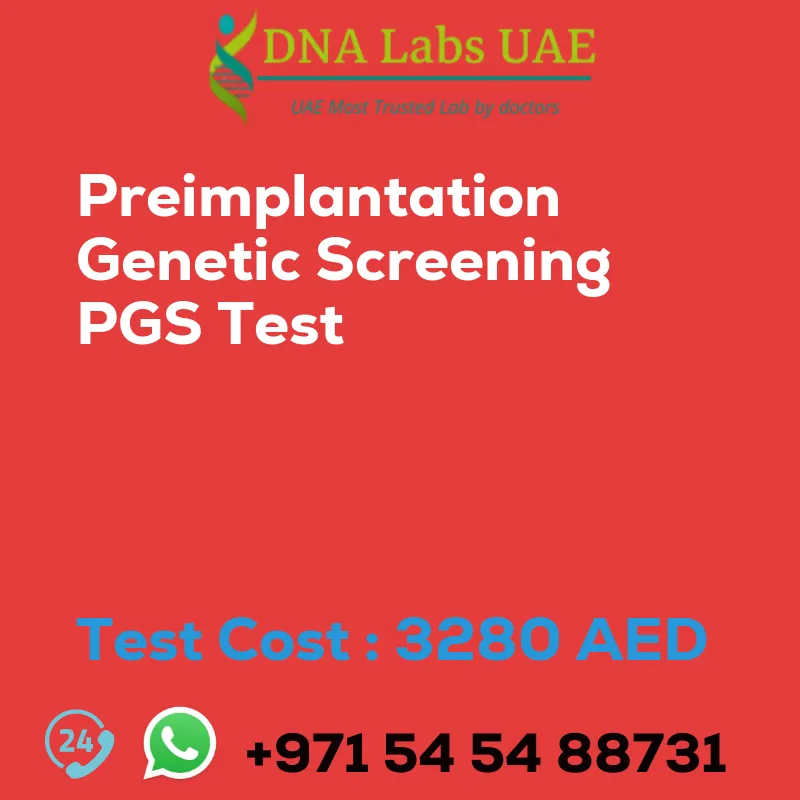PREIMPLANTATION GENETIC SCREENING (PGS) Test
Test Name: PREIMPLANTATION GENETIC SCREENING (PGS) Test
Components: Price – 3280.0 AED
Sample Condition: Submit biopsied embryo cells in a special tube available from LPL. In case of multiple embryos being tested, submit a separate tube for each embryo with a separate Lab No. @ 14,000 AED per embryo. Ship frozen in special transport containers available from LPL. Duly filled Preimplantation Genetic Screening Consent form (Form 23) is mandatory. Sample to be collected & dispatched with prior appointment.
Report Delivery: Sample to be collected on Tuesday by 9 am; Report delivered the following Tuesday
Method: Next Generation Sequencing
Test Type: Infertility, Genetic testing
Doctor: Gynecologist
Test Department: MOLECULAR DIAGNOSTICS
Pre Test Information: Sample to be collected & dispatched with prior appointment. Duly filled Preimplantation Genetic Screening Consent form (Form 23) is mandatory.
Test Details
Preimplantation Genetic Screening (PGS) is a test performed during in vitro fertilization (IVF) to screen embryos for chromosomal abnormalities before they are implanted into the uterus. It involves the biopsy of a few cells from the embryo, which are then analyzed for any genetic abnormalities.
The main purpose of PGS is to select embryos that have a normal number of chromosomes (euploid embryos) and exclude those with an abnormal number of chromosomes (aneuploid embryos). This is particularly useful for couples who have a high risk of passing on genetic disorders or for women of advanced maternal age, as chromosomal abnormalities increase with age.
The PGS test can detect various chromosomal abnormalities, such as Down syndrome (trisomy 21), Edwards syndrome (trisomy 18), Patau syndrome (trisomy 13), and sex chromosome abnormalities. It can also identify structural chromosomal abnormalities, such as translocations.
The PGS process involves the following steps:
- IVF: The woman undergoes ovarian stimulation to produce multiple eggs, which are then retrieved and fertilized with sperm in a laboratory to create embryos.
- Embryo biopsy: Typically on day 5 or 6 of development, a few cells are removed from each embryo using a specialized technique, such as trophectoderm biopsy.
- Genetic analysis: The biopsied cells are sent to a laboratory, where they undergo genetic analysis. This can be done using various techniques, including array comparative genomic hybridization (aCGH) or next-generation sequencing (NGS).
- Embryo selection: The genetic analysis results are used to determine which embryos are euploid and free of chromosomal abnormalities. These selected embryos are then chosen for transfer into the uterus.
- Embryo transfer: The selected embryos are transferred into the woman’s uterus, with the aim of achieving a successful pregnancy.
PGS has several potential benefits, including increased pregnancy rates, reduced risk of miscarriage, and the ability to select embryos free of certain genetic disorders. However, it also has limitations, such as the potential for false-positive or false-negative results, the possibility of embryo damage during biopsy, and the ethical concerns associated with embryo selection.
It is important to consult with a fertility specialist or genetic counselor to determine if PGS is appropriate for your specific situation and to discuss the potential risks and benefits involved.
| Test Name | PREIMPLANTATION GENETIC SCREENING PGS Test |
|---|---|
| Components | |
| Price | 3280.0 AED |
| Sample Condition | Submit biopsiedEmbryo cellsin special tube available from LPL. In case of multiple embryos being tested, submit separate tube for each embryo with separate Lab No. @ 14,000\ per embryo. Ship frozen in special transport containers available from LPL. Duly filled Preimplantation Genetic Screening Consent form (Form 23) is mandatory. Sample to be collected & dispatched with prior appointment. |
| Report Delivery | Sample Tue by 9 am; Report Next Tue |
| Method | Next Generation Sequencing |
| Test type | Infertility, Genetic testing |
| Doctor | Gynecologist |
| Test Department: | MOLECULAR DIAGNOSTICS |
| Pre Test Information | Sample to be collected & dispatched with prior appointment. Duly filled Preimplantation Genetic Screening Consent form (Form 23) is mandatory. |
| Test Details | Preimplantation Genetic Screening (PGS) is a test performed during in vitro fertilization (IVF) to screen embryos for chromosomal abnormalities before they are implanted into the uterus. It involves the biopsy of a few cells from the embryo, which are then analyzed for any genetic abnormalities. The main purpose of PGS is to select embryos that have a normal number of chromosomes (euploid embryos) and exclude those with an abnormal number of chromosomes (aneuploid embryos). This is particularly useful for couples who have a high risk of passing on genetic disorders or for women of advanced maternal age, as chromosomal abnormalities increase with age. The PGS test can detect various chromosomal abnormalities, such as Down syndrome (trisomy 21), Edwards syndrome (trisomy 18), Patau syndrome (trisomy 13), and sex chromosome abnormalities. It can also identify structural chromosomal abnormalities, such as translocations. The PGS process involves the following steps: 1. IVF: The woman undergoes ovarian stimulation to produce multiple eggs, which are then retrieved and fertilized with sperm in a laboratory to create embryos. 2. Embryo biopsy: Typically on day 5 or 6 of development, a few cells are removed from each embryo using a specialized technique, such as trophectoderm biopsy. 3. Genetic analysis: The biopsied cells are sent to a laboratory, where they undergo genetic analysis. This can be done using various techniques, including array comparative genomic hybridization (aCGH) or next-generation sequencing (NGS). 4. Embryo selection: The genetic analysis results are used to determine which embryos are euploid and free of chromosomal abnormalities. These selected embryos are then chosen for transfer into the uterus. 5. Embryo transfer: The selected embryos are transferred into the woman’s uterus, with the aim of achieving a successful pregnancy. PGS has several potential benefits, including increased pregnancy rates, reduced risk of miscarriage, and the ability to select embryos free of certain genetic disorders. However, it also has limitations, such as the potential for false-positive or false-negative results, the possibility of embryo damage during biopsy, and the ethical concerns associated with embryo selection. It is important to consult with a fertility specialist or genetic counselor to determine if PGS is appropriate for your specific situation and to discuss the potential risks and benefits involved. |







